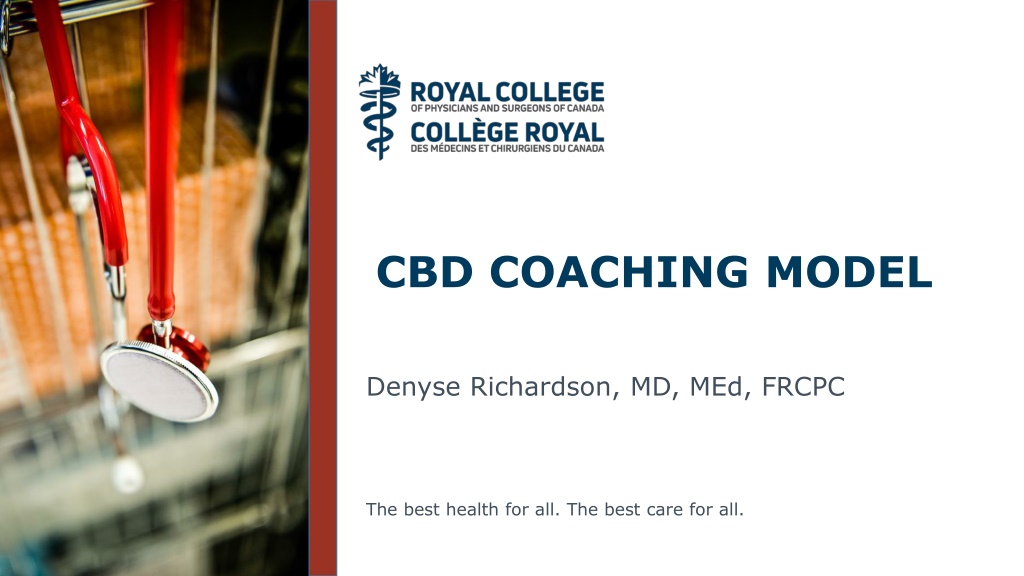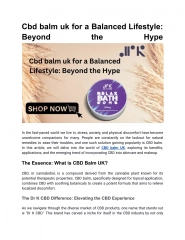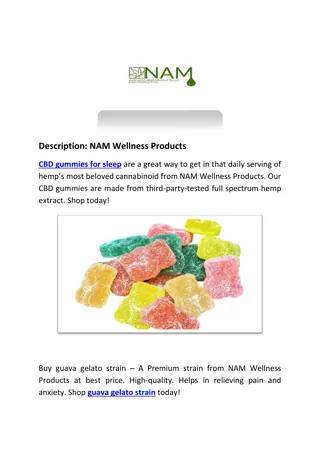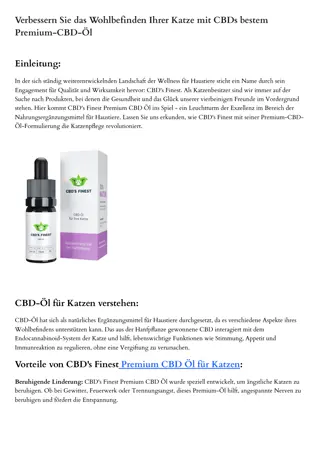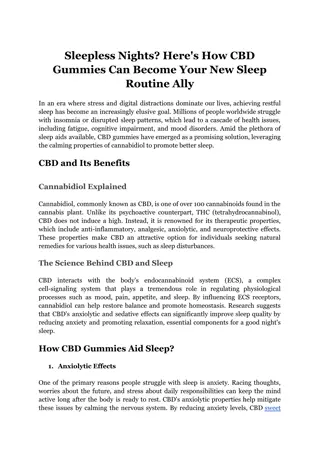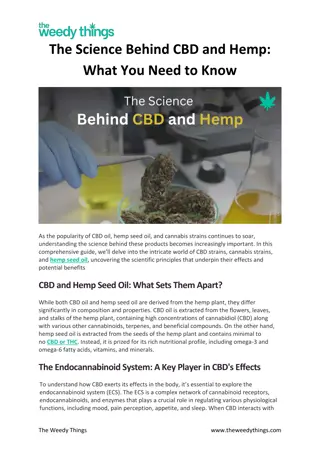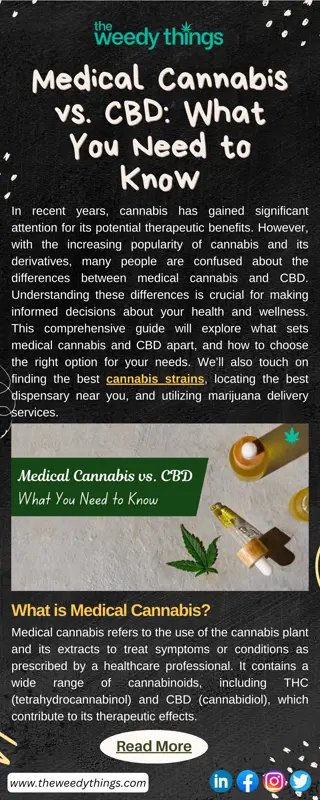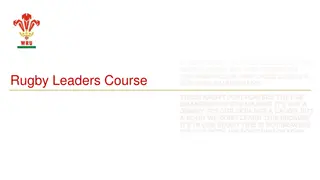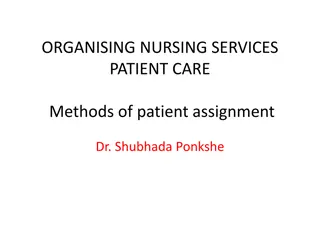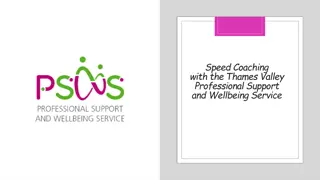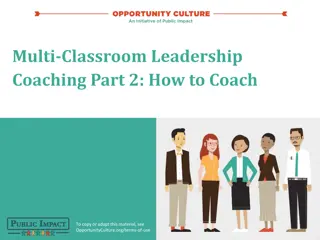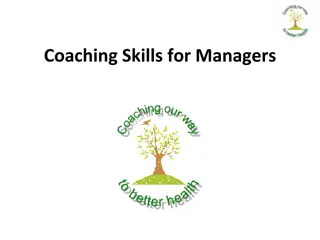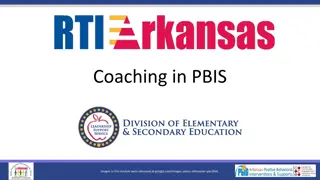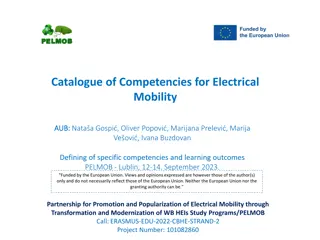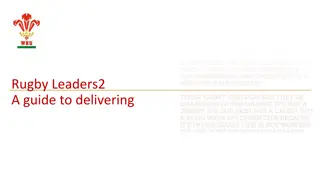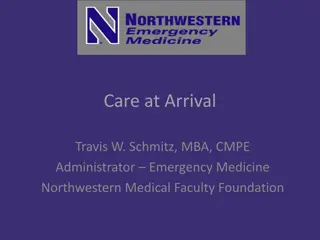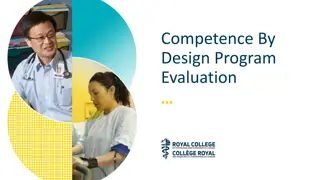Enhancing Competence and Patient Care Through CBD Coaching Model
The CBD Coaching Model, led by professionals like Dr. Denyse Richardson, focuses on facilitating the development of competence in residents to improve patient care. It emphasizes Competence by Design, workplace-based assessment, and coaching feedback to promote continuous learning and growth mindset. Through coaching, learners receive support to reflect on their performance and strive for improvement.
Download Presentation

Please find below an Image/Link to download the presentation.
The content on the website is provided AS IS for your information and personal use only. It may not be sold, licensed, or shared on other websites without obtaining consent from the author. Download presentation by click this link. If you encounter any issues during the download, it is possible that the publisher has removed the file from their server.
E N D
Presentation Transcript
CBD COACHING MODEL Denyse Richardson, MD, MEd, FRCPC The best health for all. The best care for all.
Contributors Special thanks to the following individuals who contributed to the development of this module: Denyse Richardson, MD, MEd, FRCPC Carol Aschenbrener, MD; Chief Medical Education Officer, AAMC (retired); Executive Coach (current) Farhan Bhanji, MD, MHPE, FRCPC Marissa Bonyun, MD, MEd Rose Hatala, MD, MSc, FRCPC Shelley Ross, PhD Joan Sargeant, MEd, PhD Shirley Schipper, MD, CCFP, FCFP Chris Watling MD, MEd, PhD, FRCP(C) 2
Objectives Describe the components of the CBD Coaching Model Distinguish Coaching in the Moment and Coaching over Time Explain how coaching feedback is integral to learning 3
CBD Coaching Model Facilitating learning and development of a residents competence 4
Competence by Design Improve patient care by assuring our residency programs facilitate the developmental acquisition of competencies Competency Focused Instruction Workplace-Based Assessment (WBA) 5
Coaching can help learners reflect on where their performance stands and how to improve. - Deiorio, N., 2016 7
Coaching A coach s priority is to promote improvement 8
Growth Mindset Growth Mindset: Aligns with coaching as a teaching and learning method to promote development. Fixed Mindset Growth Mindset Believes that level of achievement is predetermined, and that effort dedicated toward learning will not promote greater achievement. Believes there is potential for an individual s growth and improvement . Desires to prove and avoid looking unintelligent. Desires to learn, and looks for opportunities to challenge current status. Asks: Will I succeed or fail? Look smart or not? Asks: Will I grow? Will I overcome challenges? Questions the effort of bothering. Believes that growth and learning require effort. Ignores constructive criticism. Learns from feedback and uses it to improve. Click to review full table (English only) Dweck, 2006 9
Paradigm Shift of Thinking Assessment FOR Learning (Observations) Formative assessment Low stakes, safe environment Embedded in the learning process (frequent and ongoing) Goal: monitor learning/progress and provide immediate feedback that can be used to improve teaching/learning (feedback loop) Summative assessment High stakes Happens at the end of the learning process Goal: judge/evaluate learning at that particular instant in time Assessment OF Learning 10
CBD Coaching Model Facilitating learning and development of a residents competence 11
Coaching in the Moment is workplace-based, occurs in a clinical environment a key component of Workplace-Based Learning part of normal learning activities low stakes and frequent timely and efficient Guidance for improvement 12
Coaching in the Moment: A Process 1)RAPPORT 2)EXPECTATIONS 3)OBSERVE 4)COACH 5)RECORD RX-OCR 13
Initial Conversation: Rapport Employ techniques to create a safe learning environment Form an educational partnership Growth mindset Being explicit about the part of the clinician s role as a learning coach RAPPORT 14
Factors affecting the Educational Partnership MUTUAL UNDERSTANDING of learner s goals and how to attain them Telio, S et al. 2015, Bing-You, R et al. 2017 PERCIEVED COMMITTMENT/ENGAGEMENT of the educator to learner improvement Recipient s perception of the relationship is the key determinant of the alliance s success Eva K et al 2012, Telio, S et al. 2016 15
Initial Conversation: Expectations Discuss specific learning goals and objectives, related to milestones, competencies and EPAs EXPECTATIONS 16
Observation of Work* Workplace- Based Observation * Key ingredient in Assessment FOR Learning OBSERVE 17
Observation Direct Observation a clinician watching a resident doing work in real time or asynchronously (i.e. videotaped) Indirect Observation review of products of the resident s work clinical notes, presentations, or written reflections observations from secondary sources 18
Engage in a Coaching conversation Between the clinician and the resident Related to the task that was observed To ensure the resident understands how improvements could be made (growth mindset) COACH 19
Coaching a one-to-one conversation focused on the enhancement of learning and development through increasing self-awareness and a sense of personal responsibility, where the coach facilitates the self-directed learning of the [learner] through questioning, active listening, and appropriate challenge in a supportive and encouraging climate. Van Niewerburgh C, 2012 20
Coaching Feedback Coaching Feedback = feedback + actionable suggestions for improvement Coaching Feedback Feedback = information about what was observed compared to an expected standard Feedback Observer makes determination of quality of observed task Observation of Work 21
Record a Summary Recording a summary of feedback and actionable suggestions for improvement that were given is essential Every Coaching interaction might not be documented but a representative sample during that clinical time is needed It is important to document outlier performances because they could be rare but important RECORD 22
CBD Coaching Model Facilitating learning and development of a residents competence 23
Coaching Over Time Another educational partnership/alliance A longitudinal relationship between clinician and learner Learners: greater responsibility for reviewing observation data & setting learning goals 24
Coaching Over Time: Two Goals 1. To guide residents in their clinical performance progress: a. Help to synthesize the multiple types of observation data received 2. To facilitate the learner s development of skills in self- regulated learning by engaging the learner in the process of guided self-assessment. Help the learner to: a. Set learning goals b. Process feedback and observation data related to goals c. Establish or revise new learning goals in response to their progress or other data 25
Portfolio Data Caverzagie and Lobst 26
Coaching and Progression Model Coaching and competence committees: Competence Committees - decide Coaches develop 27
Summary Resident Learning & Development Educational Partnerships Assessment FOR Learning (observations) Coaching Feedback for Improvement Coaching in the Moment Multiple low stakes observations RX-OCR Coaching over Time Guiding resident progression over time Facilitating lifelong learning skills 28
References Archer, J et al. 2010. State of the science in health professions education and effective feedback. Medical Education. 44 (1): 101-8. Bing-You et al. 2018. The Feedback Tango: An Integrative Review and Analysis of the Content of the Teacher Learner Feedback Exchange. Academic Medicine. (e-pub ahead of print, 2017). Constance, L et al. 2010. Coaching in Emergency Medicine. Canadian Journal of Emergency Medicine. 12 (6): 520-4 Deiorio, N et al. 2016. Coaching: A new model for academic and career achievement. Medical Education Online. 21 (1). 29
References Gifford, K et al. 2014. Doctor Coach: a deliberate practice approach to teaching and learning clinical skills. Academic Medicine. 89 (2): 272-6. Ross, S et al. 2016. Context, time, and building relationships: bringing in situ feedback into the conversation. Medical Education. 50 (9): 893-5. van de Ridder, JM et al. 2008. What is feedback in clinical education? Medical Education. 42 (2): 189-97. Sargeant, J et al. 2018. The R2C2 Model in Residency Education: How Does It Foster Coaching and Promote Feedback Use? Academic Medicine. Volume publish ahead of print. Retrieved from: https://journals.lww.com/academicmedicine/Abstract/publisha head/The_R2C2_Model_in_Residency_Education___How_Does .98012.aspx 30
References Telio, S. 2015. The "educational alliance" as a framework for reconceptualizing feedback in medical education. Academic Medicine. 90 (5): 609-14. Telio, S. 2016. Feedback and the educational alliance: examining credibility judgements and their consequences. Medical Education. 50 (9): 933-42. Watling, C et al. 2014. Learning culture and feedback: an international study of medical athletes and musicians. Medical Education. 48 (7): 713-23. 31
